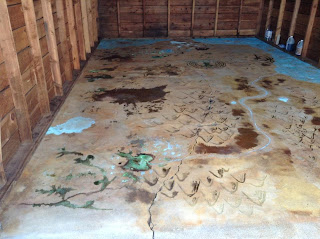Where did
your interest in maps come from? Is it only maps in books (like fantasy novels)
or all kinds of maps?
My
undergraduate degree is in Landscape Architecture and Environmental Planning.
The founder of Landscape Architecture was Frederick Law Olmsted. He designed
New York City’s Central Park and many other wonderful parks and cities as well.
My interest in maps grew from there although if I think about it I’ve always
been fascinated with knowing where I stand. Maps in novels to me are a
wonderful bonus. Some books would probably be just fine without them but with
them we know where the story is taking place and how that character moves
through his environment. I really like all kinds of maps.
I’ve spent
seven years as a civil engineer. I’ve drawn maps of new roads, sewer systems,
water systems and storm drainage systems. The coolest part of doing that type
of work is that these maps or plans have been built and people use and live in
them today.Why do you think writers and readers find maps so interesting?
Maps ground
us, they give some sense to what lies ahead. Maps give both the writer and reader
a sense of the setting. Are we near a river or a seaside, in a mountain valley
or the Dead Marshes found in JRR Tolkien’s Lord of The Rings? Personally I love
to know the path that a character has made through a map and if there is a map
with a novel and the story mentions places that are not on the map it can be a
bit frustrating.
Do you think maps are always necessary in fantasy novels? What other fiction books have maps?
I don’t think
the maps are a necessity in fantasy novels. Like Ron Koertge mentioned this
summer at Hamline, they can aid in the writing process and help move the plot of
the story forward. I’m not one hundred percent sure but the more I have thought
about this the more it seems to make sense. If you have a character in your
story that moves through a space that he/she interacts with, more than just
passing through, then a map is needed to get the writer to be consistent. This
deals with a sense of scale as well too.
I just finished reading Patrick
Rothfuss’s King Killer Chronicles
where Kvothe spends a great deal of time at the University. Patrick drew up the
University. These smaller scale places like a University or Hogwarts tend to be
three dimensional. Often the main character explores and gets to know these
spaces much more than any flat character would ever dream of. For example,
Kvothe goes to classes just like the rest of his schoolmates but he spends time
on the roof tops of the University buildings and spends time below in the sewer
ways and steam vents and finds running water and tunnels his way into places
that are off limits to him. Harry Potter does the same thing at Hogwarts. These
places and the maps that are either quickly sketched up or meticulously drawn
out become part of the stories’ characters.
What benefits are there for a writer to create a map, even if it doesn't go into the final book?
First and
most importantly they are fun but maps will map the writing process out. If you
know that Christopher Paolini’s Eragon and his dragon Saphira are traveling
with some dwarves and an elf on the eastern edge of the map from the Beor
Mountains down the Az Ragni River eventually to end up in the elf city of
Ellesmera in the Du Weldenvarden forest you have much of the plot laid out for
you not to mention all the cool setting that they get to travel through. All
kinds of cool adventure can happen but you know that your character will start
at point A and end up at point B, aiding in moving your plot forward.
What inspired you to create the map on your garage floor? Can you tell me about
it - where, when, what, how?
My Critical
thesis is what started it really. I’ve wanted to create a place away from my
wife and three daughters that I can call my own, to write and be inspired by my
surroundings. The cool thing about what I drew up on my garage floor is that it
isn’t any place just yet. I have a coast line, some mountain ranges, some
swampy areas, and dry arid climates too. I think that the when is the question
I can answer right now, I’m jumping head first into my critical thesis and
surrounding myself with maps.
Anything else you want to add?
Anything else you want to add?
Thanks, Michael! I think your garage floor is amazing!






